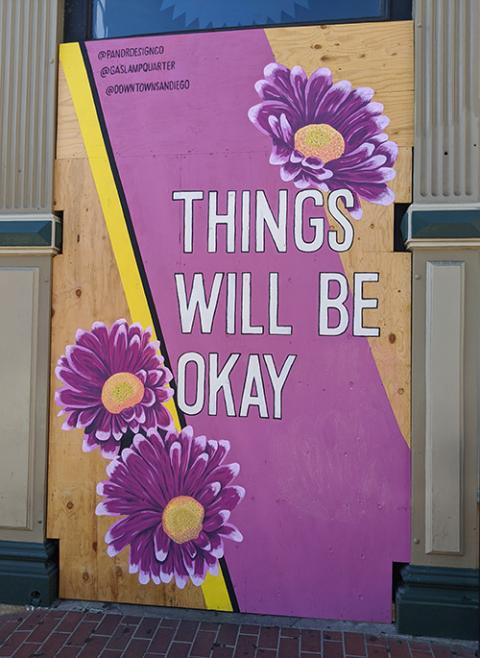
Wicked questions help us learn about the world around us. I used the "wicked question" line of thought to investigate this partial jawbone found during an environmental education training, discovering it was likely the remnant of a deer. (Courtesy of Katherine Bullock)
My years of service have taught me the importance of asking wicked questions.
Wicked questions are often defined by their unpleasant, unpredictable or unreasonable nature. They are, in short, the questions most worth asking.
According to Marshall Watson of Louder Than Ten, a project management group that promotes critical reflection and inquiry:
"Modern western society places far more value on answers than it does on questions. ... Good questions are often powerful and inspiring. But really important questions can also be scary or difficult to ask (and even scarier and more difficult to answer). Our truly wicked questions can feel unpleasant and unreasonable while also feeling exceptional and important; they embody a tension between good and bad, scary and inspiring."
I was only recently introduced to this concept within my Notre Dame Mission Volunteers program, but wicked questions embody a nostalgic sort of remembrance. They spark inquiry, engagement and exploration, tapping into the childlike curiosities we had about the world long before those curiosities were hushed when we found there weren't answers or there wasn't interest in answering them.

Notes from the Field writer and my friend Jaesen Evangelista, right, is enjoying her time post-service by focusing on her own well-being. In this case, Jaesen is spending time with an old friend, Tiffany Dang, in Anaheim, California, nourishing her mental and social health. (Courtesy of Jaesen Evangelista)
Many situations I've encountered over the past two years — some based on the idea that "we've always done it this way" — have prompted me to wonder: When did we stop asking questions? When did we stop asking questions that matter?
I was reminded of this topic yet again when my fellow Notes from the Field writer and dear friend Jaesen Evangelista shared that she was stepping out of her year of service with the St. Joseph Worker Program to better care for her mental health.
As a friend, I wanted to support Jaesen. I also wanted to honor her time and her voice shared in her writing with Notes from the Field. So I moved beyond my wonderings of "what happened?" and began asking wicked questions.
Reflecting upon Jaesen's decision led me to recall the lives and stories of countless other friends who have similarly stepped out of long-term service programs. As I sat with sadness for my friends and the countless communities they have touched in service, I realized that asking "what happened?" wasn't enough. I owed it to Jaesen, and others, to embrace the hard questions.
I settled upon one very wicked two-part question:
Why do so many volunteers leave extended service programs, and how can we collectively support a culture that prioritizes the holistic well-being of those oriented toward service?
This question isn't easy to ask or answer, but I knew it was important. So I got to work.
In pursuit of deeper understanding, I spoke in-depth with a few peers — including two former Notes from the Field writers, Jaesen and Ali Alderman — who recently committed to long-term service and either left their programs early or did not extend their service.
I witnessed a certain strength, humility and, ultimately, gratitude in these shared perspectives and reflections, and I am incredibly grateful to the storytellers.
Advertisement
Stories indeed drove most of my conversations with interviewees: how living a year of service didn't turn out anything like it was advertised, how frustration arose in the pressure to accept religious beliefs and narratives pushed upon volunteers, and how community can sometimes not be a happy, healthy place to be. Living a life of service is complex, after all, as so many women religious know!
At its most basic level, living a year of service is a commitment. It's not really like a regular day job you can step into and out of or even quite like a job in a service-oriented field that forces many to live and breathe their work. Of course, every program is different, but, as one of my interviewees put it, long-term volunteering is a "niche realm."
I have experienced this myself. Friends or family don't always understand exactly what I do, and new friends or partners are confused why I invest so much into my work and community. While I track hours in my program, many volunteers don't, and sometimes it's difficult — or unbelievable — to accurately report the hours spent working; thinking about, brainstorming for, or processing service; and building relationships in community. It's an all-consuming lifestyle.
This "niche realm" of long-term service often carries with it implications of selflessness and often leaves volunteers without a livable income and at the mercy of their organization(s).
For many volunteers I spoke with, these undertones of necessary selflessness in service often promoted a culture contrary to holistic well-being. That's not to say that selflessness and individual well-being are mutually exclusive; after all, the saying is "you can't pour from an empty cup," not "you can't pour at all if you're filling your own cup." There can be both pouring and filling. Like most things, it requires a balance.

My own service support system at Nazareth has included my site director, Ellen Sprigg, center, and her daughter, Lauren, left. Ellen works as associate director of the Lay Mission Volunteer Program with the Sisters of Charity of Nazareth, Kentucky, and has nearly adopted me as a "second daughter" in my adjustment to life at Nazareth. Her support and oversight have helped me to balance and thrive in my years of service. (Courtesy of Judy Gerwe)
Sadly, most of the volunteers with whom I spoke felt a pressure of constant selflessness in their service experiences that promoted a culture of doing more and being more of service as opposed to consistently checking in and taking inventory of their well-being.
For some, this culture was bolstered by an objective of solidarity that instead of accompanying the community led to feelings of resentment and excessive burnout when volunteers were forced to live selflessly and humbly, denying their own long-term needs.
For others, including Jaesen, this pressure manifested as a lack of control and agency in their lives during their service commitments. I heard of some programs that limit volunteers' abilities to see local family or friends and/or fill volunteers' schedules with work, reflection, and "community time" on weekdays, weeknights and weekends. After a while, this isn't sustainable.

This mural in San Diego gave me hope throughout the COVID-19 pandemic when I was struggling with my own anxiety. For many, the pandemic ignited long-overdue conversations about mental health and well-being. It's now on us to normalize these conversations in our day-to-day. (Julia Gerwe)
The COVID-19 pandemic seems to have exacerbated this pressure too. Volunteers like Ali voiced that the added stress of living in a community of individuals with differing COVID-19 comfort levels and working without clear organizational guidelines regarding COVID-19 proved to heighten feelings of powerlessness in years of service.
Some volunteers who were able to combat this mentality referenced their own experiences in setting boundaries and self-advocacy. Personally, I am grateful to a host community that has been welcoming and intentional about my integration and well-being. However, programs and communities are different, as are people's abilities and contexts to set boundaries.
When the onus is on the individual, communities suffer. As Ali so poignantly articulated, mental health in our communities won't improve until we move past the idea that "my mental health is my responsibility (or my fault)." Mental health is communal, and only by destigmatizing conversations and changing the narrative about what taking care of one's mental health looks like can we collectively move forward, Ali shared.
This striking reflection represents how many of my conversations with former volunteers pivoted as we talked: Stories of independent challenges of service gave way to deeper reflections on the nature of work, service and societal growth.
Many peers in my generation are beginning to ask wicked questions surrounding the nature of work and our futures within a Western, work-obsessed society — questions further propelled by a global pandemic that has led many to consider how they're living their lives to the fullest in each moment.
For some volunteers who stepped out of years of service, the question became, "Am I going to stay and sacrifice my own happiness and well-being to serve my community?" For Jaesen, there was power in realizing that while it's good to care about other people, other people also care about you. At the end of the day, no one wants you to sacrifice for them. This allowed Jaesen to choose caring for herself.
With a deeper understanding of why so many volunteers leave extended service programs, I challenge us all to think about the latter half of my wicked question: How can we collectively support a culture that prioritizes the holistic well-being of those oriented toward service?
Supporting this cultural shift begins with these conversations, and it is my hope that we continue reflecting on the roles we play in supporting each other, taking care of ourselves, and building communities that prioritize doing the same.
After all, as one volunteer shared, "We've got to keep it real. We're all human — not saints, just yet."






